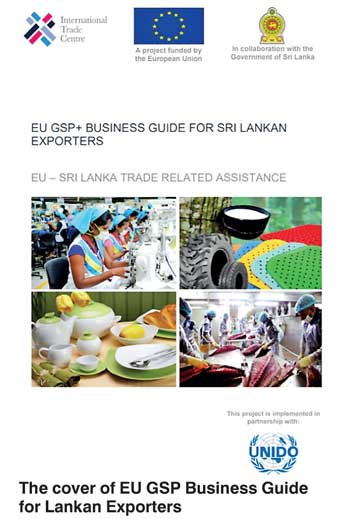Monday Feb 16, 2026
Monday Feb 16, 2026
Friday, 8 December 2017 00:11 - - {{hitsCtrl.values.hits}}
 The first comprehensive and near step-by-step guide for Lankan exporters to export under the European Union (EU) GSP Plus scheme has been released.
The first comprehensive and near step-by-step guide for Lankan exporters to export under the European Union (EU) GSP Plus scheme has been released.
Titled the ‘EU GSP+ Business Guide for Sri Lankan Exporters’ manual, it is produced by Geneva’s International Trade Centre (ITC) in collaboration with the Sri Lankan Government and is funded by the EU. It is now available online.
Minister of Industry and Commerce Rishad Bathiudeen welcomed the publication of the comprehensive manual yesterday.
“This is more proof of our Unity Government’s transparent approach to international trade. We thank the International Trade Centre and the EU for their ongoing support to us,” Bathiudeen said at a meeting with top officials at the Ministry. The information in the guide was collected in June 2017. Although the guide says it is “an overview of relevant information for exporters from Sri Lanka”, it appears to be even more comprehensive in its coverage.
It highlights the GSP regulation enumerating the 27 conventions mentioned in Article 9 of the GSP Regulation, including the core human and labour rights UN/ILO Conventions. The guide does “not constitute legal advice and does not provide exhaustive information on all sectors”, saying it is “the responsibility of exporters from Sri Lanka to ensure compliance with all relevant EU rules.” It stresses that exporters need to register with the Ministry of Industry and Commerce and the Department of Commerce (DoC) under it. Exporters wishing to export under a preferential agreement or scheme that Sri Lanka benefits from need to apply for a Certificate of Origin and are required to register with the DoC. The documents required for registration are a duly completed application form along with an original business or company registration certificate with a copy, VAT/TIN registration certificate issued by the Department of Inland Revenue, Export Development Board (EDB) registration certificate (if registered), membership or registrations with other trade promotion organisations, association, trade chambers (e.g. Sri Lanka Tea Board, Trade Chambers, etc.) and production process flowchart if applicable.
The registration fee is a one-time payment of Rs. 10,000. The guide explains the relevant rules of origin applicable to apparel under GSP+, relevant institutions in the EU and additional resources such as web portals where Lankan exporters can obtain more information.
It also lists requirements for Lankan apparel exporters to secure GSP+ such as a cost statement or affidavit, the material sheet for garment or apparel products and the material sheet for products other than garments. The manual is now available online at www.intracen.org/EU-SRI-LANKA/Resources-and-materials/. The direct link to the online file itself is www.intracen.org/uploadedFiles/intracenorg/Content/Redesign/Projects/EU-SRI_LANKA/GSP%20Business%20Guide%20English_Final.pdf . The guide is downloadable free of charge.